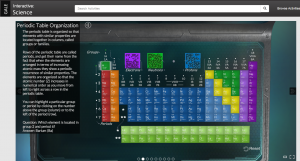By Deb Kirby
Seeking relief from the overload of rancorous political discussion last week, I decided to focus on something different. When I discovered that February 7 is National Periodic Table Day, I had my plan: Finally learn some basics about the periodic table, which I had somehow managed to avoid in school. (Reading a book a day in my middle and high school years may have enhanced my reading skills, but since my genre of choice was the historical romance, did not do much for my understanding of things like Chemistry.)
I turned to Gale’s Science In Context to learn more about the periodic table and the recently released Gale Interactive: Science for a hands-on learning experience.
Here are a few of the interesting things I learned:
- The first pure elements have been known since the time of the ancient Greeks who used the metallic elements gold (Au), silver (Ag), tin (Sn), copper (Cu), lead (Pb), and mercury (Hg).
- Except for the discovery of trace amounts of a naturally occurring isotope of plutonium, every element past uranium in the periodic table has been made by scientists in high-energy particle accelerators.
- In 1864, an English chemist named John Newlands suggested that when the elements were arranged according to atomic weight, similar chemical properties would be found with every eighth element. He named his hypothesis the “law of octaves,” comparing the pattern of eight elements to that of the eight notes of the musical scale. The basic idea behind his hypothesis–a connection between atomic weight and chemical properties–was valid, though he lacked sufficient evidence to support his claim His comparison of elements to musical notes was ridiculed as being “mystical” and unscientific. However, Newlands’ idea was not nearly as farfetched as that of another chemist, who claimed to have found a connection between atomic weight and the distances of the planets from the Sun.
Using the Gale Interactive: Science product is helping create a new view of science and users can “experiment” to their heart’s content both inside and outside the classroom.

Do you need a break from politics? There’s a world of opportunity in the many disciplines and subjects covered in Gale’s databases. If science is not your thing, there’s always history (World History In Context), Famous and Infamous People (Biography In Context), or the world of genre fiction – like historical romance – find your next great read in Books And Authors.

About the Author
When Debra, a 30-year veteran of the publishing industry, is not working or reading, she can be found gardening, running, swimming, or pursuing the lifelong learning that is at the tip of her fingers via Gale databases.


